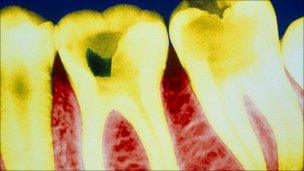Poverty link to Scots child tooth decay
- Published

A quarter of more than 4,000 children surveyed showed signs of tooth decay
A third of three-year-olds living in poverty in Scotland suffer from poor dental health, a new study has suggested.
Researchers at Glasgow University said that while one in every four children tested showed signs of tooth decay, the figure rose to 33% among the poorest.
They have called for deprived children to be given dental help from birth.
The two-year study, involving more than 4,000 children, is published in the British Dental Journal.
The research team from the University of Glasgow Dental School assessed children living in Greater Glasgow for decayed, missing or filled teeth.
They found evidence of decay in at least 25% of cases.
'Totally preventable'
However, amongst those from deprived areas, the incidence of decay was even higher, with a third of those surveyed exhibiting evidence of cavities.
Commenting on the findings, Andrew Lamb, Scottish director of the British Dental Association, said that as adult oral health could be predicted by childhood dental health, targeted intervention was vital to close the inequality gap.
He added: "While there has been a significant improvement in the nation's oral health over the past 40 years, this study highlights the depressing fact that poor dental health and inequality are closely linked from very early in life.
"Given that tooth decay is totally preventable, it's unacceptable that social deprivation is still such a strong marker of poor dental health.
"This study reinforces the importance of providing support to children from deprived communities soon after they are born."